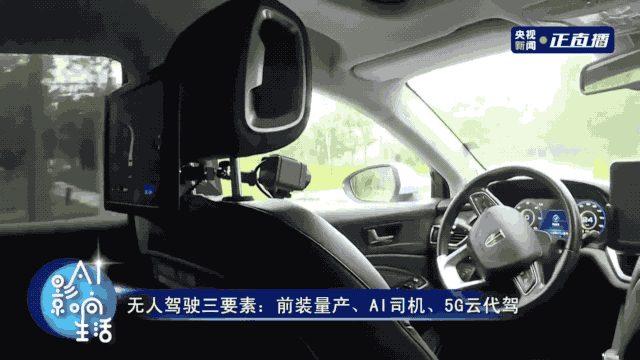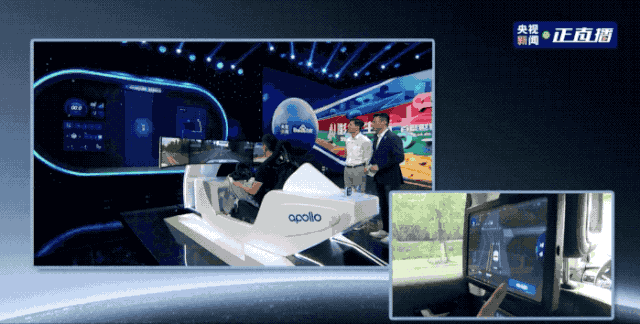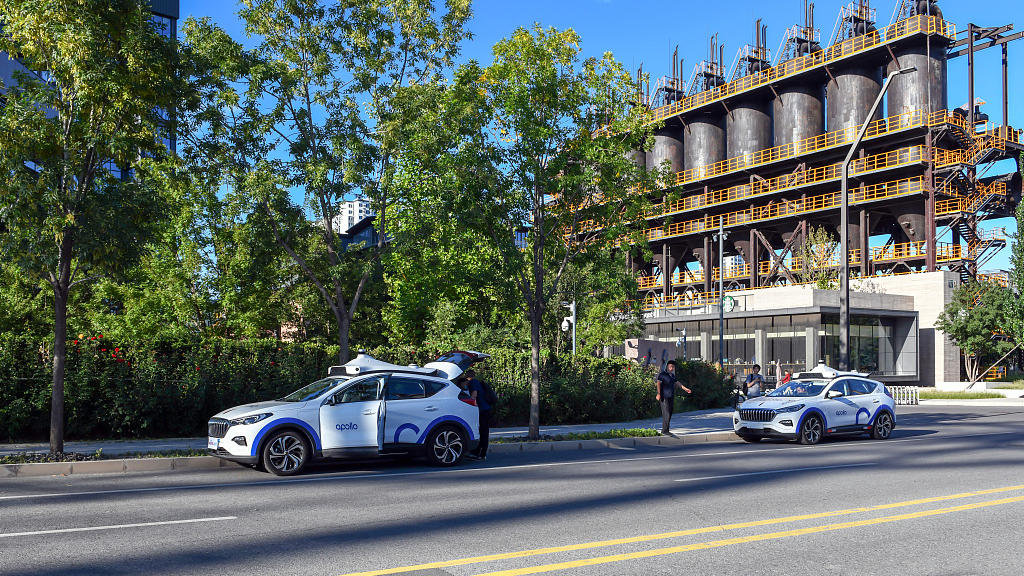
A fully autonomous driving vehicle is operating itself inside Beijing's Shougang Park, where the 2022 Winter Olympic Organizing Committee is located, September 16. /GIF from CCTV's live show
A fully autonomous driving vehicle is operating itself inside Beijing's Shougang Park, where the 2022 Winter Olympic Organizing Committee is located, September 16. /GIF from CCTV's live show
We know that autonomous vehicles will be a part of our future since carmakers around the world have have shifted their focus to the cutting-edge technology, pouring money into the emerging market. But the question is how soon?
A fully-automated vehicle without a driver behind the wheel remains an ambitious and eye-catching endeavor for many manufacturers.
However, the search-engine giant Baidu, also a member of China's artificial intelligence (AI) "national team," gave the industry the latest at their annual tech event.

Baidu CEO Robin Li introduced their L4 Apollo autonomous platform to the audience while a state-media anchor was testing the technology outside the studio in Beijing's Shougang Park, September 16. /GIF from CCTV's live show
Baidu CEO Robin Li introduced their L4 Apollo autonomous platform to the audience while a state-media anchor was testing the technology outside the studio in Beijing's Shougang Park, September 16. /GIF from CCTV's live show
Apollo's 3 trump cards for autonomous driving
During a live show on Tuesday, Baidu CEO Robin Li introduced their L4 Apollo autonomous platform to audiences, while a state-media anchor was also testing the technology outside the studio in Beijing's Shougang Park, where the 2022 Winter Olympic Organizing Committee is located.
Powered by the AI driving system, a Robotaxi hit the road without even bothering to onboard passengers. Starting, accelerating, braking and parking – it can totally drive on its own, free from human intervention.
According to the company, the "AI driver" is able to handle various technological unmanned driving challenges, even under extreme conditions, like a heavy blizzard or on a rural dirt road.
But when emergencies are out of control, human operators in the company's control center will jump in instantaneously and take over the situation via its 5G remote driving service to provide immediate assistance until problems being solved.
"The three core components of Apollo's fully automated driving technology are pre-installed and mass-produced vehicles, the 'experienced AI driver', and the 5G remote driving service," said Li Zhenyu, Baidu's vice president.
The company launched 300 L4 autonomous vehicles, the biggest robotaxi fleet in Changsha, Hunan Province in early July, becoming the first domestic company to acquire the license for "T4" road-tests – an open-road test license, signifying that an autonomous vehicle has the ability to drive on complex urban roads, tunnels and school zones and respond to a range of complicated scenarios.
Data shows Apollo's Robotaix has completed over six million kilometers of road testing with a record low of zero accidents. Vehicles embedded with the Apollo platform have carried over 100,000 passengers across 27 cities around the world.
02:04

Full rollout may not be till 2025
However, full commercial operations of autonomous driving vehicles are still several years away with technical problems, high costs and lack of clear regulations.
"Technology problems remain the biggest challenge," said Li, adding that Robotaxis won't be fully commercialized until 2025. The "current market remained relatively small and that an underdeveloped supply chain meant costs were still high."
Compared to a normal taxi, the manufacturing cost of a Robotaxi is about one million yuan (147,000 U.S. dollars) per vehicle, much higher than the per-vehicle cost of making a standard taxi currently, the South China Morning Post reported citing the company information.
The situation for Baidu's global competitors is almost the same. Automakers and tech companies in the U.S. including Waymo, Tesla Inc and Uber Technologies are investing billions in the autonomous driving industry.
But industry insiders have said it would take years for the technology to mature and for the public to trust autonomous vehicles.
Ashley Nunes, a Harvard researcher, told Financial Times that: "Bringing the tech to market will require fundamentally rethinking the concept by scaling back where and how the tech can be deployed and the types of returns investors can expect."